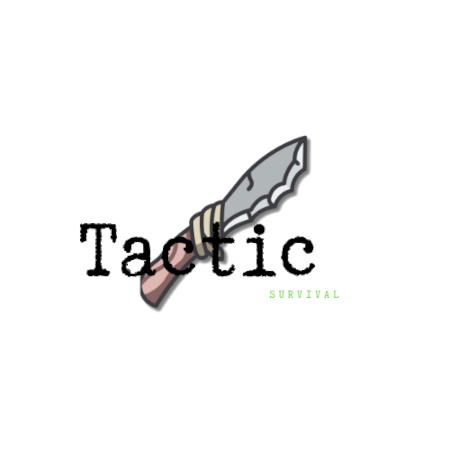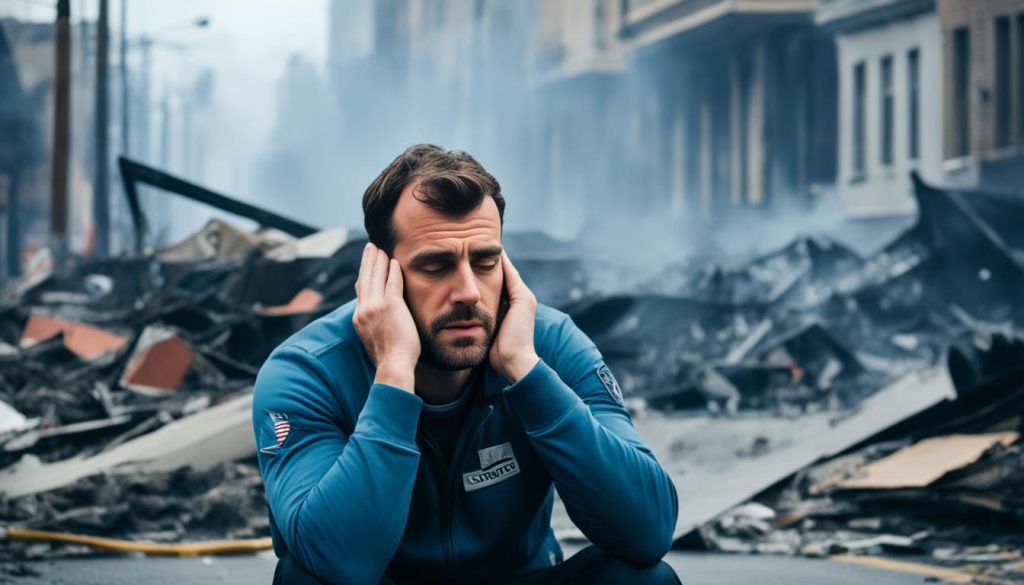Disasters, both natural and man-made, can really shake us. Studies show the stress they bring can stick around. This can affect how quickly we think and how tough we are.
Stocking up on supplies is key, but so is looking after our minds. Knowing what to expect and being ready can help us be stronger. We can face disaster challenges better.
This article is about getting your mind ready for disasters. We’ll talk about planning for disasters and spotting stress signs. Developing ways to cope is also a big part. And we’ll look at how to build toughness to handle tough times.
Key Takeaways:
- Mental preparedness is crucial for resilience development in the face of disasters.
- Stockpiling physical supplies is important, but protecting your mental well-being is equally crucial.
- Planning for different types of disasters, recognizing signs of stress, and building resilience are essential for effective coping.
- Mental preparedness involves developing cognitive agility and psychological readiness.
- By taking proactive steps to prepare your mind, you can enhance your ability to cope with the challenges that disasters present.
Planning for Disaster
Disaster preparedness begins with thorough research to keep your community safe. Start by learning about potential disasters in your area and how to evacuate. Knowing where to find safe, well-stocked shelters is key during a crisis.
The Importance of Community Research
Community research is crucial for effective disaster planning. It gives agencies important data for reducing risks and responding fast. This kind of research lets experts form plans that meet your town’s unique needs when danger strikes.
“Understanding your community’s special challenges and strengths is key for smart disaster planning.” – American Public Health Association (APHA)
Valuable Resources for Disaster Planning
The American Public Health Association (APHA) has many resources for disaster readiness. Their materials cover everything from risk checks to how to talk in an emergency. Using these can help agencies make strong plans that support their people.
It’s also good to work with local groups like the fire and police departments. Together, they can plan better, share info, and be ready to fight disasters as a team.
Community Research Checklist
| Research Area | Tasks |
|---|---|
| Potential Disasters |
|
| Evacuation Procedures |
|
| Shelter Preparedness |
|
Recognizing Signs of Stress
Disasters really impact our emotions, bringing higher stress levels and emotional changes. When a disaster hits, you might feel shocked, unable to focus, or find yourself moodier. Kids can show they’re stressed by acting out more or doing risky things.
It’s key to see these stress signals early, so we can handle them better. Knowing how disaster stress shows up helps us support each other. This way, we can take steps to help and be there for those who need it.
Thankfully, there are ways to help deal with the emotional weight of disasters. Things like deep breathing, relaxing, and changing our thoughts can make a big difference. These tools are great at dealing with the impact of stress after a disaster.
Adding these strategies to our daily lives is smart. They help us manage stress better, keep our emotions stable, and make us stronger against disaster effects.
Supporting Quote:
“Understanding and recognizing the signs of stress in yourself and others is crucial for effective coping and response in the face of disaster-related challenges.” – Dr. Emily Roberts, Psychologist
Building Resilience
Resilience is key for handling tough times and recovering from them. It means making good plans, managing emotions, and keeping a clear mind. These skills are super important when facing big challenges.
Studies show being resilient helps mental health, especially after disasters. Like in Nepal, where researchers found that faith and being part of a strong community helped people bounce back after the earthquake (source: NCBI).
In a village hit by the 2015 Nepal earthquakes, another study looked at how people’s mental health changed. It found that understanding and dealing with the emotional fallout after a disaster is crucial for getting through it (source: NCBI).
Knowing when you’re stressed and what to do about it is also crucial for staying strong. In Nepal post-earthquake, fewer people were getting health help while stress was high. This underlines the need to actively manage our mental well-being in tough times.
Resilience is the ability to navigate adversity and adapt to change. It is not a fixed trait but rather a skill that can be developed through various strategies and interventions.
Groups like the American Psychological Association have useful advice and support for coping with disasters. They offer proven methods to manage emotions and make it through hard times.
Building resilience takes a well-rounded effort. By understanding how disasters affect us, spotting stress signals, and having ways to cope, we can get stronger. This helps us not just survive, but thrive, even when life gets really tough.
| Study | Findings |
|---|---|
| Study on mental health and psychosocial problems following the Nepal earthquakes | Prevalence rates in a representative cluster sample survey reached 27% (source: NCBI) |
| Lessons learned one year after the 2015 Nepal earthquake | Documented in a 2017 publication (source: NCBI) |
| A study from Turkey on psychological resilience factors among earthquake survivors | Explored various factors contributing to psychological resilience (source: NCBI) |
Preparing for Emotional and Social Impacts
Dealing with disasters means thinking about more than just being physically ready. It’s important to think about your feelings and relationships, too. Making a self-care plan upfront is smart. It can guide you through tough times. By thinking ahead about how stress might affect you and figuring out what helps, you can boost your well-being and strength.
It’s crucial to know how to take care of yourself after a tough event. Do things that make you feel better and show yourself kindness. If you need it, don’t hesitate to get professional support. Your self-care plan will help keep you mentally and emotionally well.
Building a Support Network
Having strong connections is key when things get hard. It’s critical to have friends and family to lean on. They can help with both emotional and practical needs, making it easier for you to bounce back. Make sure to build a group of supportive people around you, including friends, neighbors, and local groups.
Also, find out about the community resources near you. There are places you can go for counseling and support, or you might find helpful hotlines or organizations. These resources can play an enormous part in staying mentally healthy after a disaster.
Remember, you’re not alone in dealing with the fallout of a disaster. By planning ahead with self-care and building a strong network, you’re setting yourself up for success. These steps will help you face whatever challenges come your way.
Conclusion
Being ready in our minds is just as important as having stuff ready for disaster. It’s key to be ready mentally and physically. Plan for bad times, watch for stress, and get strong inside. This prepares us to handle any kind of emergency better.
It’s important to get mentally ready ahead of time. Make a plan to take care of yourself. Also, connect with others and find help in your community. This boosts our ability to deal with tough times.
Focusing on our mental strength helps us bounce back from hard times. It teaches us to handle stress and come out stronger. In our world, being mentally strong is essential for a safer future.


